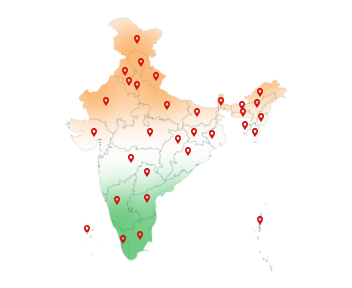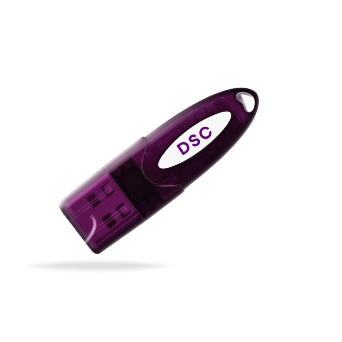28-Jul-2025
Digital Signature vs Aadhaar eSign: Better for Tax Filing?
It's tax season, and one digital signing mistake could derail your entire return. Whether you're a salaried employee, freelancer, or business owner, knowing when to use Aadhaar eSign vs Income Tax DSC can mean the difference between smooth filing and a rejected ITR.
In 2025, digital signatures aren't just a convenience—they're a legal and compliance essential. While both Digital Signature Certificates (DSC) and Aadhaar eSign are valid under Indian law, their usage depends heavily on your taxpayer profile. If your accounts are audited or you're filing on behalf of a company or LLP, an Income Tax DSC is not optional—it's mandatory.
Need a trusted DSC for your ITR filing? Buy Capricorn DSC today—quick setup, UIDAI-compliant, and 100% secure for Income Tax, MCA, GST, and more.
What is a Digital Signature?
A Digital Signature Certificate (DSC) is a secure electronic signature tool issued by a certifying authority. It authenticates your identity and ensures the integrity of digitally signed documents. Many tax professionals now rely on dsc online services to buy & obtain certificates quickly and securely, meeting the UIDAI verification norms and tax compliance standards.
Understanding the difference between DSC vs eSign is important, especially when comparing it to Aadhaar eSign online options. A DSC Token Signing method is often preferred for its enhanced security.
Why is it Important for Income Tax?
For income tax purposes, a Digital Signature Certificate (DSC) is often mandatory if you're a company, LLP, or an individual whose accounts are subject to audit under Section 44AB. The Income Tax DSC requirement is not optional in such cases—it's a statutory necessity.
Without it, your return may be rejected or considered invalid. Hence, complying with DSC regulations ensures smooth income tax filing and avoids penalties or processing issues.
Benefits of Using Income Tax DSC in 2025
Using a DSC for income tax comes with several advantages:
1. Regulatory Compliance: Filing returns under audit mandates a DSC, as per Income Tax Department guidelines.
2. High-Level Security: DSC Token Signing ensures your return cannot be tampered with, offering top-tier encryption.
3. Reusability: The same DSC can be used across platforms like MCA, GST, eProcurement, and legal services.
4. Legal Validity: Recognized under the IT Act, Digital Signatures are admissible in courts and government procedures.
For anyone involved in professional, corporate, or high-value financial dealings, an Income tax DSC setup isn't just beneficial—it's essential. For added convenience, applying for a DSC online is now possible, with most providers offering Aadhaar-based eKYC through UIDAI-linked mobile verification.
What is Aadhaar eSign?
Aadhaar eSign is a digital signature method that uses your Aadhaar number for OTP or biometric-based verification. It's powered by UIDAI, and it allows you to sign documents online using just your Aadhaar-linked mobile number. Many users prefer Aadhaar eSign online for its ease and quick verification, especially when compared to more complex processes like DSC Token Signing.
Why is it Important for Income Tax?
You can use Aadhaar eSign online for:
- Filing income tax returns as an individual or Hindu Undivided Family (HUF) not subject to audit.
- Verifying small-value forms, applications, or government documents.
- Digitally signing documents for personal transactions, like loan forms or service requests.
While Aadhaar eSign is legally valid and convenient, it may not offer the same level of legal protection and encryption as a DSC. That's why for audited filings or corporate submissions, Income Tax DSC remains the best option.
Benefits of Using Aadhaar eSign
- Quick and paperless verification using Aadhaar-linked mobile number.
- Suitable for individuals not under audit requirements.
- Helps with seamless signing of personal and government documents.
However, some taxpayers confuse DSC & eSign options with Aadhaar eSign, but they are not always interchangeable. Each serves a specific legal and security function. For higher-level authentication or company filings, dsc online options and Digital Signature Certificates offer more comprehensive security and legal backing.
Which is More Secure Aadhaar eSign or DSC?
One of the biggest differences between DSC and Aadhaar eSign lies in the method of authentication and the level of encryption.
DSC uses hardware-based security through a physical USB token, often referred to as DSC token signing. This token is protected by a personal PIN, ensuring only the rightful user can use it. The cryptographic key used to sign documents is stored in the token, making it virtually impossible to forge.
Aadhaar eSign, on the other hand, relies on OTP or biometric authentication linked to your Aadhaar card. It's convenient, but OTPs can be intercepted, and there's limited protection if your Aadhaar-linked mobile number is compromised.
For critical filings like Income Tax DSC, security and compliance take priority over convenience. This is why dsc vs esign debates typically favor DSC when legal accountability and encryption strength are considered.
Mandatory Use Cases for DSC
Here are the most common cases where DSC for income tax is required:
1. Filing ITR for companies and LLPs.
2. Filing tax returns for individuals and firms whose accounts are audited under Section 44AB.
3. Submitting documents on the Income Tax Department portal where DSC authentication is explicitly required.
4. When filing forms on behalf of another entity or during rectification processes.
If you fall into any of the above categories, Income tax DSC filing is non-negotiable.
When Can You Use Aadhaar eSign Instead of DSC?
Aadhaar eSign is a good alternative when:
1. You're filing ITR-1 or ITR-4 as a salaried individual or freelancer with no audit requirement.
2. You want a quick, easy, and cost-effective way to e-verify your return.
3. You need to sign personal or low-risk documents where DSC is not mandated.
However, it's important to note that DSC & eSign and Aadhaar eSign are not interchangeable in many government use cases. Where Income tax DSC is compulsory, Aadhaar eSign simply won't work.
How to Apply for a DSC Online in 2025?
To get your DSC online, follow these simple steps:
1. Visit a licensed Certifying Authority like Capricorn CA
2. Select the certificate type suitable for DSC Income tax filing.
3. Complete Aadhaar eKYC or video verification as per UIDAI norms.
4. Upload documents like PAN, Aadhaar, and a photo.
5. Receive your DSC token, and install it on your system.
After setup, you can immediately start using it for all tax-related tasks, ensuring you're compliant with Income tax DSC rules and regulations.
Final Thoughts
Here's the bottom line: if your filing is simple, unaudited, and personal, Aadhaar eSign might be enough. But if you're filing on behalf of a company, an LLP, or your returns are audited, Income tax DSC is your only compliant and secure option.
Both Aadhaar eSign and Digital Signatures serve important roles, but they are built for different use cases. One prioritizes convenience, the other ensures security and legal validity.
Don't take chances with your income tax filing. Know your requirements, choose the right digital tool, and ensure your submission is secure, valid, and accepted by the system.
Get Your DSC Today for Secure Income Tax Filing
If you need a DSC for income tax, buy Capricorn DSC now. With the 2025 deadline approaching, getting your DSC online is quick and easy. Look for providers that support DSC token signing and full UIDAI-compliant verification, so you stay compliant and secure across all platforms.
Whether you're comparing dsc vs eSign, looking into DSC & esign solutions, or planning your Income Tax DSC purchase, make sure you're fully informed before you file.


